In the construction industry, winning a project isn’t just about the quality of your work — it’s about how fast you respond, how well you communicate, and how efficiently you manage leads, clients, subcontractors, and project updates. Today’s construction companies operate in a world where speed beats size, organization beats chaos, and customer experience beats low bids.
But here’s the truth most construction businesses never realize:
You don’t lose projects because your work is bad — you lose them because your system is.
And that’s exactly where a construction-focused CRM becomes your biggest competitive edge. It helps you track every lead, manage every bid, follow up on time, coordinate teams, and keep clients updated — all without chasing paperwork or losing deals due to miscommunication.
Whether you’re a general contractor, home builder, remodeler, or specialized trade contractor, the right CRM can increase conversions, streamline operations, and create a professional client experience that sets you apart.
Why Construction Companies Need a Dedicated CRM
Construction businesses operate differently from typical sales organizations, and that’s why they need CRM systems built with construction-specific workflows in mind. Unlike fast retail sales, construction projects involve long sales cycles, complex bidding processes, multiple approvals, on-site inspections, and frequent changes in project scope. Without a structured system, these steps can easily slip through the cracks and cause delays, lost opportunities, and dissatisfied clients.
Construction workflows are different from traditional sales cycles. You must manage:
- Long bidding processes
- Multiple stakeholders
- Site visits & inspections
- Proposals, estimates & change orders
- Field & office communication gaps
- Delayed decisions and follow-ups
-
Client expectations throughout the project lifecycle
A dedicated CRM centralizes all of this — making your business run smoother, faster, and more profitably.
How a Construction CRM Improves Your Business
A strong CRM transforms how construction companies work — not just during the sales stage, but throughout the entire customer journey. It helps teams capture leads instantly from websites, ads, and calls, while automatically placing them into organized pipelines. Contractors can send estimates, proposals, and contracts directly from the CRM, eliminating paperwork and speeding up conversion times.
A powerful CRM helps construction companies:
- Track every lead automatically from website, calls, referrals, or ads
- Send estimates and proposals faster
- Follow up with clients at the perfect time
- Streamline communication between office, field staff, and clients
- Store all job details, photos, and documents in one place
- Improve job conversion rates with structured pipelines
- Keep clients happy with transparent updates
In short, a CRM brings organization, automation, and professionalism to your construction business.
How We Selected the Top 10 Construction CRMs (Criteria)
Choosing the best CRMs required analyzing tools that truly fit the unique needs of construction professionals. Our selection focuses on platforms that offer a balance of usability, advanced automation, mobile friendliness, and industry-specific features rather than generic sales tools. We evaluated each CRM based on real-world performance, customer feedback, and the platform’s ability to support both small contractors and large construction businesses.
The evaluation criteria included:
- Construction-focused features: Lead tracking, job pipelines, proposals, estimates, document storage, subcontractor coordination, etc.
- Ease of use: Whether field teams and non-technical employees can operate it easily.
- Automation capabilities: Automatic reminders, follow-ups, scheduling, workflow triggers.
- Integrations: Compatibility with project management, accounting, and construction software like Procore, Buildertrend, QuickBooks, and Sage.
- Pricing vs. value: Whether the features justify the cost for small and large contractors.
- Mobile app quality: Because field accessibility is essential for contractors on the move.
-
Actual user reviews: Verified insights from Google, Capterra, G2, and Trustpilot.
This ensures the list reflects real, practical value — not just marketing claims.
Top 10 Best CRM for Construction Companies
Here is the final list of the best CRMs for construction companies:
- Procore
- Buildertrend
- CoConstruct
- monday.com CRM
- HubSpot CRM
- Zoho CRM
- JobNimbus
- TopBuilder CRM
- Houzz Pro
- Pipedrive
1. Procore
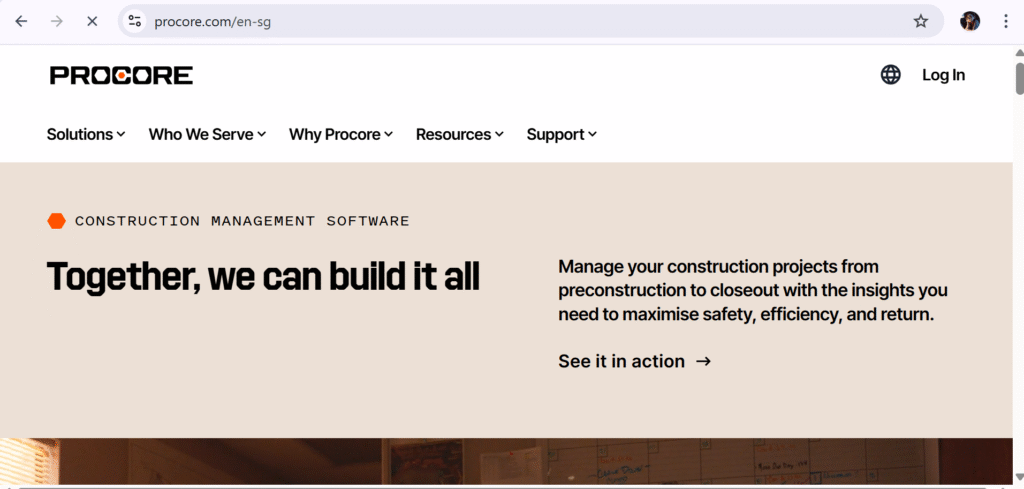
Overview
Procore is one of the most widely recognized construction management platforms used by contractors, builders, and engineering firms around the world. Unlike traditional CRMs that focus mainly on sales pipelines, Procore offers an end-to-end suite that handles everything from preconstruction to closeout. Its CRM capabilities integrate directly with project management tools, allowing teams to move seamlessly from lead generation to job execution. Procore provides the level of organization and transparency needed for modern construction operations.
Features
- Centralized lead tracking and project pipeline
- Automated bid management and proposal creation
- Real-time communication tools for office-to-field teams
- Document control for drawings, RFI, submittals, and safety logs
- Scheduling and task management for jobsite coordination
- Financial tools including budgets, estimates, and cost management
- Integrations with accounting platforms like QuickBooks, Sage, and Viewpoint
Review
Procore consistently receives praise from construction businesses for its comprehensive capabilities and reliability. Users appreciate that every part of a project — bidding, communication, job costing, and documentation — stays connected within a single platform. Customer support is known to be responsive. Overall, Procore is considered a premium solution for companies wanting full visibility across their entire project lifecycle.
Pros
- Extremely comprehensive construction toolset
- Strong CRM features integrated with project management
- Excellent mobile experience for field workers
- Highly scalable for both mid-size and large companies
Cons
- Premium pricing may be high for small contractors
- Requires onboarding time due to its depth
Final Verdict
Procore is ideal for construction businesses that want one unified system for managing leads, projects, finances, and field operations. Its pricing is higher than basic CRMs, but the value it delivers in reducing errors and improving team coordination makes it one of the strongest choices.
2. Buildertrend
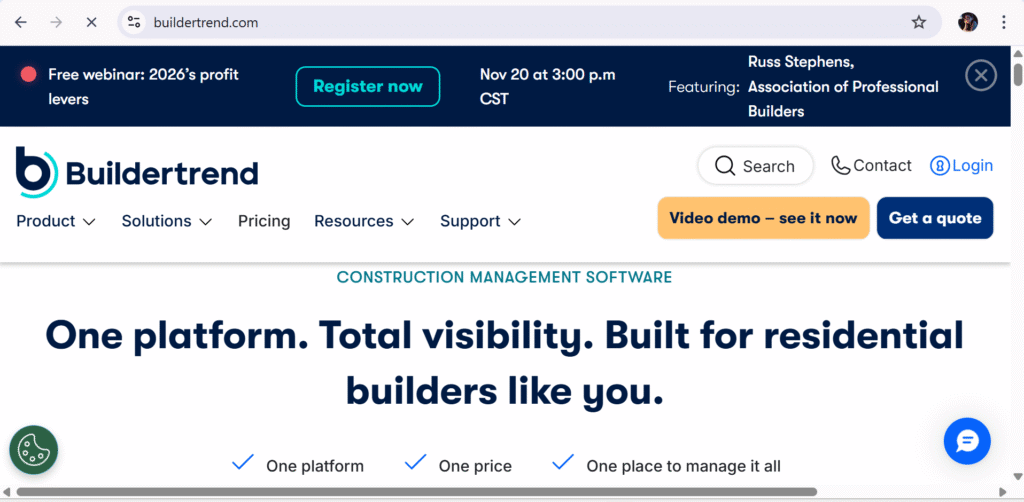
Overview
Buildertrend is a leading CRM and construction management platform built specifically for home builders, remodelers, and specialty contractors. It focuses heavily on client experience, offering tools for proposals, job scheduling, client portals, and financial management—all under one easy-to-navigate interface. What makes Buildertrend stand out is its ability to merge CRM functionality with day-to-day operations, helping contractors manage leads while also running ongoing projects efficiently.
Features
- Lead management and automated follow-ups
- Customizable sales pipelines for different job types
- Digital estimates, proposals, and e-signatures
- Job scheduling with Gantt charts and calendar views
- Client communication portals and progress updates
- Invoicing, payment tracking, and cost control tools
- Integrations with Gusto, QuickBooks, Xero, and other tools
Review
Buildertrend receives consistently strong reviews because of its excellent usability and well-designed features tailored to small and mid-sized construction firms. Contractors appreciate its client portal, which helps reduce miscommunication and improves professionalism. The platform is not as advanced as Procore in terms of large enterprise project management, but for residential builders, it is regarded as one of the most reliable choices.
Pros
- Excellent for small and mid-size builders
- Strong CRM + project management combination
- Easy to use with minimal training
- Great client communication and scheduling tools
Cons
- Not ideal for very large construction enterprises
-
Some advanced features require higher-tier plans
Final Verdict
Buildertrend is an outstanding option for residential contractors, remodelers, and specialty trades looking for a CRM that also helps run their projects smoothly from start to finish.
3. CoConstruct
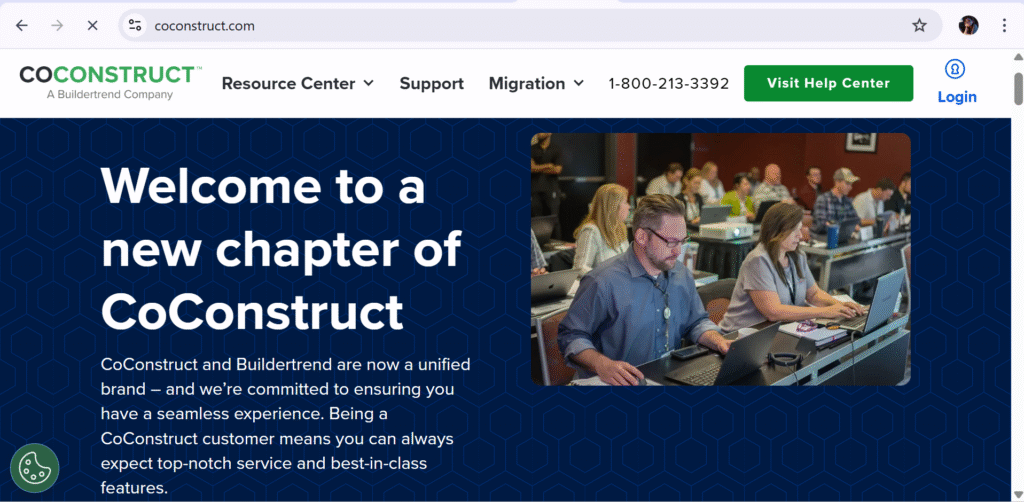
Overview
CoConstruct is a purpose-built CRM and project management system designed specifically for custom home builders, remodelers, and construction firms that require tight coordination across clients, subcontractors, and internal teams. What makes CoConstruct exceptional is its ability to centralize communication, budgets, selections, bids, and client interactions in one synchronized environment. Its CRM component helps contractors nurture leads from initial inquiry to proposal and contract signing.
Key Features
- Capture leads from websites, referrals, and email inquiries
- A centralized digital space for clients to monitor project progress, selections, messages, and files
- Allows users to build accurate estimates using templates, compare vendor quotes
- Helps clients choose materials, finishes, and fixtures while automatically updating budgets and timelines.
- Create detailed project schedules linked with tasks, reminders, and field crew updates so nothing is missed.
- Integrates budgets, invoices, and change orders to offer transparency for both internal teams and clients.
Review
CoConstruct stands out for its depth and specialization. While many CRMs serve multiple industries, CoConstruct focuses exclusively on construction workflows, making its tools exceptionally aligned with real-world project needs. Contractors love how it reduces back-and-forth communications by keeping clients informed through automated updates. Its estimating and financial features are especially powerful for firms managing cost-sensitive projects.
Pros
- Tailored specifically for residential builders and remodelers
- Excellent client communication and transparency
- Strong estimating and financial tools
- Reduces manual admin work
Cons
- Interface may feel overwhelming for beginners
-
More expensive than general-purpose CRMs
Final Verdict
CoConstruct is a premium choice for construction businesses that want a specialized, powerful CRM and project management solution in one. Its depth, accuracy, and transparency tools make it ideal for custom home builders.
4. Monday.com CRM
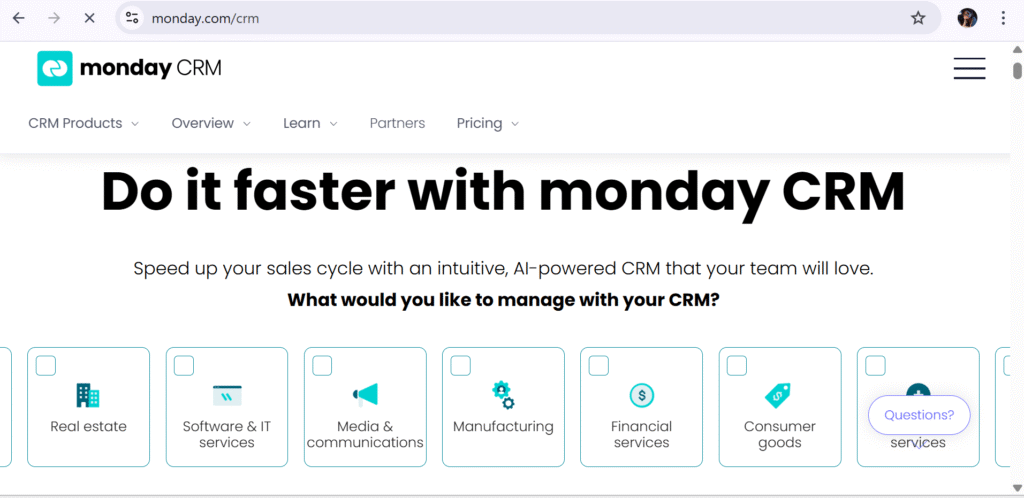
Overview
Monday.com CRM is a highly flexible and visually intuitive platform used widely across industries, including construction companies seeking a customizable workflow system. Its strength lies in adaptability—contractors can design pipelines, communication boards, project stages, and follow-up processes exactly how they want them. It is ideal for construction businesses that prefer a simple interface but still want powerful automation, team collaboration, and client management features.
Key Features
- Visual “boards” that track leads, clients, job progress, tasks, and timelines — fully adaptable to construction workflows.
- Sends follow-up reminders, bid status updates, and project alerts without manual input.
- Stores proposals, contracts, photos, and email threads in one place.
- Enables synchronized communication between office staff, field workers, and subcontractors.
- Helps track each lead from first contact to contract signing using clear stages.
- Works with Google Workspace, Outlook, Slack, QuickBooks, Procore, and many others.
Review
Monday.com CRM is loved for its simplicity and visual clarity. Construction firms appreciate how straightforward it is to set up pipelines and organize leads without needing advanced technical skills. Its automation tools significantly reduce repetitive tasks like sending follow-up emails or updating job status.Overall, it offers a balanced blend of accessibility and customization.
Pros
- Extremely easy to use and customize
- Clean, visual dashboards
- Excellent automation tools
- Integrates with most construction apps
Cons
- Not built exclusively for construction
-
Requires integrations for advanced financial tools
Final Verdict
Monday.com CRM is a fantastic choice for construction companies that want a flexible, user-friendly CRM system that streamlines leads, communication, and team coordination. It works especially well for growing businesses that need customization and simplicity in one platform.
5. HubSpot CRM
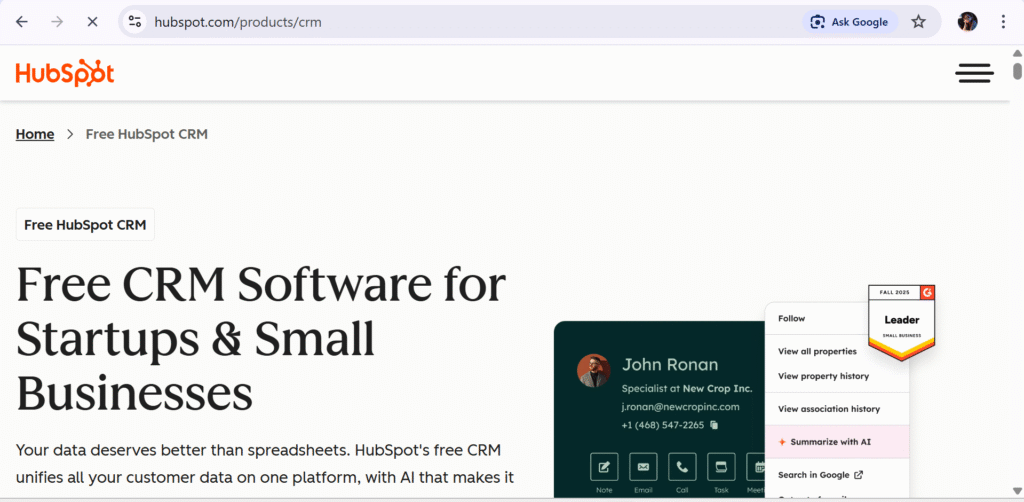
Overview
HubSpot CRM is one of the world’s most trusted customer management systems known for its zero-cost entry, strong marketing tools, and seamless automation. Construction companies use HubSpot to manage leads, track inquiries, nurture cold prospects, schedule follow-ups, and streamline communications across teams. What makes HubSpot exceptional is its marketing power — email automation, landing pages, form integrations, and analytics allow construction companies to generate more leads.
Key Features
- Integrates with websites, ads, and landing pages to automatically add new leads into pipelines.
- Sends follow-up messages, reminders, and drip campaigns to nurture potential clients.
- Organizes leads by stages, tracks conversion performance, and centralizes communication.
- Helps contractors schedule consultations, calls, and site visits without manual coordination.
- Provides detailed insights about lead sources, sales performance, and marketing ROI.
- Works with project management tools, calendars, invoicing systems, and construction-focused apps.
Review
HubSpot shines in commercial and residential construction where marketing plays a big role in capturing clients. The CRM is extremely intuitive, allowing contractors to manage a large number of leads without losing track. Its marketing tools are unmatched, enabling companies to remain visible, follow up consistently, and convert prospects more effectively. It complements those tools perfectly through integration.
Pros
- Free CRM is highly functional
- Powerful marketing and automation
- Great for lead-heavy businesses
-
Sleek dashboards and analytics
Cons
- Paid features can become expensive
- Requires integrations for estimating or project management
Final Verdict
HubSpot CRM is an ideal choice for construction companies wanting to grow leads and improve client communication. Its marketing automation and organized pipelines make it a powerful engine for business development.
6. Zoho CRM
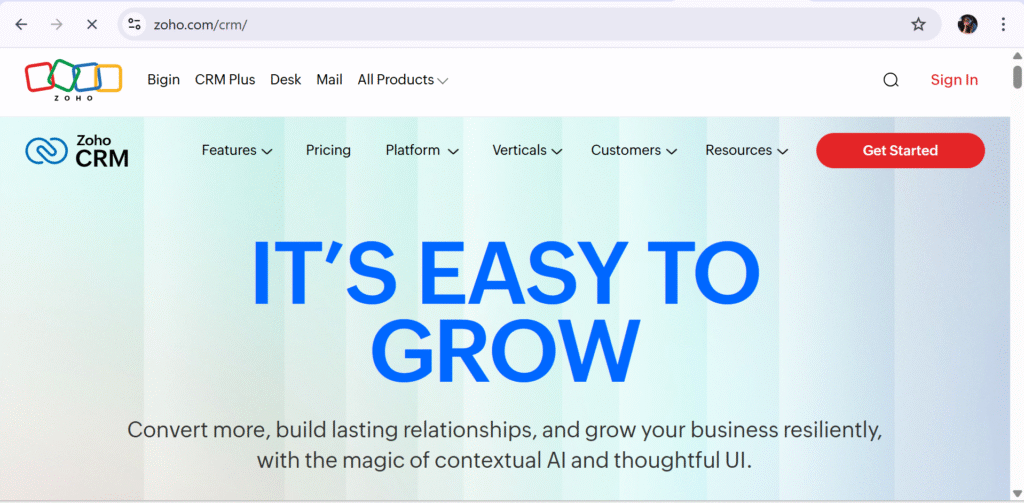
Overview
Zoho CRM is a scalable and budget-friendly platform that offers impressive power and flexibility for construction companies of all sizes. It is known for its automation tools, customizable modules, and analytics—making it easy to organize leads, standardize communication, assign team tasks, and centralize client information. Zoho CRM works well for contractors who need a more affordable yet advanced system that performs well for both simple and complex sales operations.
Key Features
- Tailor lead stages, job types, client categories, and sales processes to construction industry standards.
- Predicts lead score, follow-up opportunities, and communication patterns.
- Sends reminders, automates communication, and assigns tasks based on triggers.
- Stores proposals, drawings, photos, and contracts in organized folders.
- Manage calls, emails, WhatsApp, SMS, and social media in one CRM.
- Works with Zoho Projects, QuickBooks, Google Workspace, calendars, and field apps.
Review
Zoho CRM is highly praised for its value—offering advanced features at a significantly lower cost than many competitors. Construction companies appreciate its adaptability, allowing them to create custom modules for bids, site inspections, subcontractors, and project stages. While Zoho requires some setup to fully fit construction workflows, its customization options are vast.
Pros
- Very affordable compared to major CRMs
- AI insights improve sales accuracy
- Strong workflow automation
-
Works well for growing companies
Cons
- Setup can be time-consuming
- Not construction-specific out of the box
Final Verdict
Zoho CRM is one of the best budget-friendly CRM solutions for construction companies needing advanced automation, customization, and scalability. It is ideal for contractors who want full control over workflows without paying enterprise-level pricing.
7. JobNimbus
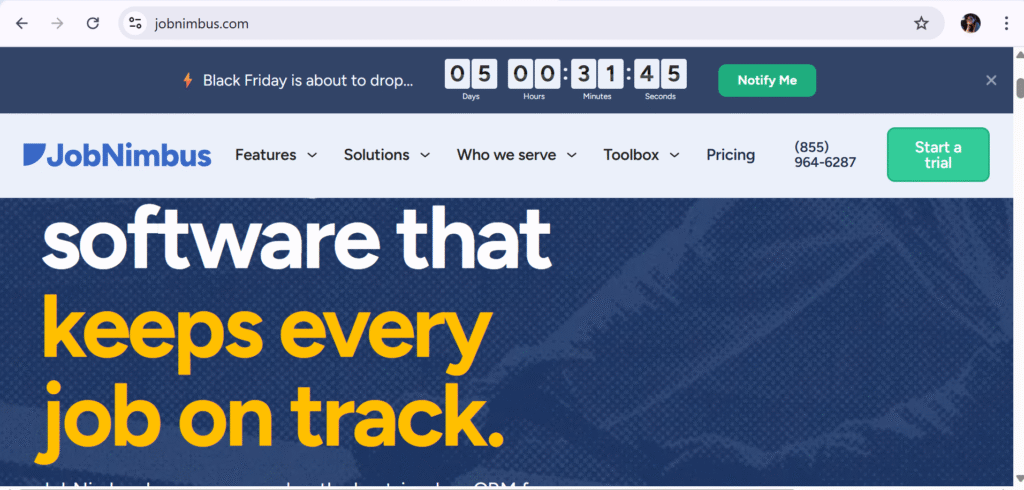
Overview
JobNimbus is especially popular among roofing companies, exterior contractors, and home improvement businesses because of its clean interface and strong workflow automation. It offers a full CRM system combined with job tracking tools, helping contractors manage leads, proposals, scheduling, and communication from a single dashboard. The platform integrates seamlessly with measurement tools , material suppliers, and accounting software.
Features
- Detailed CRM with customizable pipelines
- Job scheduling and automated workflow sequences
- Proposal creation, invoices, and digital payments
- Photo and document storage for jobsite updates
- Integration with EagleView, QuickBooks, Beacon, CompanyCam, etc.
- Mobile app for field reporting and real-time updates
Review
JobNimbus earns high ratings due to its simplicity and speed. Many contractors love that the system doesn’t overwhelm them with unnecessary complexity while still offering automation, communication, and job tracking that significantly reduce paperwork. Its integration ecosystem is one of the strongest among mid-tier CRMs. Some users feel the interface could be more modern, but overall, the experience remains reliable and effective.
Pros
- Excellent for roofing and home improvement companies
- Strong workflow automation
- Affordable and easy to set up
- Wide range of industry-specific integrations
Cons
- Interface design is simpler compared to premium tools
-
Some advanced features require configuration
Final Verdict
JobNimbus is ideal for contractors who want a lightweight but powerful CRM that keeps both office and field teams organized without overwhelming them.
8. TopBuilder CRM
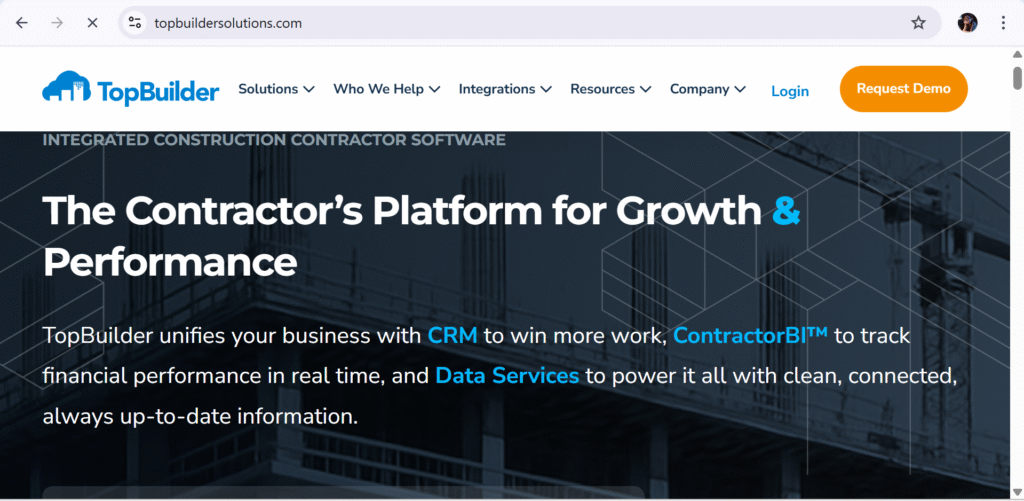
Overview
TopBuilder CRM is a construction-focused customer relationship management platform designed specifically for builders, contractors, remodelers, and construction service providers. Unlike generic CRMs, TopBuilder understands the construction sales cycle—from lead capture to proposal creation to job follow-ups—and provides tools that align with how contractors actually work. It centralizes communication, tracks every potential project, and helps teams stay organized.
Key Features
- Organizes every lead by project type, location, stage, and probability.
- Helping teams prioritize high-value opportunities.
- Provides ready-to-use construction templates that speed up quoting and ensure professional, consistent proposals.
- Built-in newsletters, automated drip campaigns, and follow-up sequences designed for construction branding.
- Stores past project details, customer information, and job outcomes for easy reference and future upselling.
- Syncs with Outlook, Gmail, Mailchimp, and major construction ERPs and estimating tools.
Review
TopBuilder CRM excels for construction firms that need a workflow tailored to the industry. Its specialized tools for automated proposals and lead tracking significantly reduce administrative overhead, allowing teams to focus on closing projects. Contractors benefit from its organized dashboards that track all client interactions, bids, and historical project data. It ensures that no lead is overlooked and that each project moves smoothly.
Pros
- Designed specifically for the construction industry
- Automates proposals and follow-ups
- Centralizes lead and project tracking
- Reduces manual administrative task.
Cons
- Initial setup can be time-consuming.
-
Best suited for mid-sized companies, not ideal for very small firms
Final Verdict
TopBuilder CRM is a robust solution for construction businesses seeking a professional, industry-focused CRM. Its specialized tools for lead management, proposals, and client communication make it an essential platform.
9. Houzz Pro
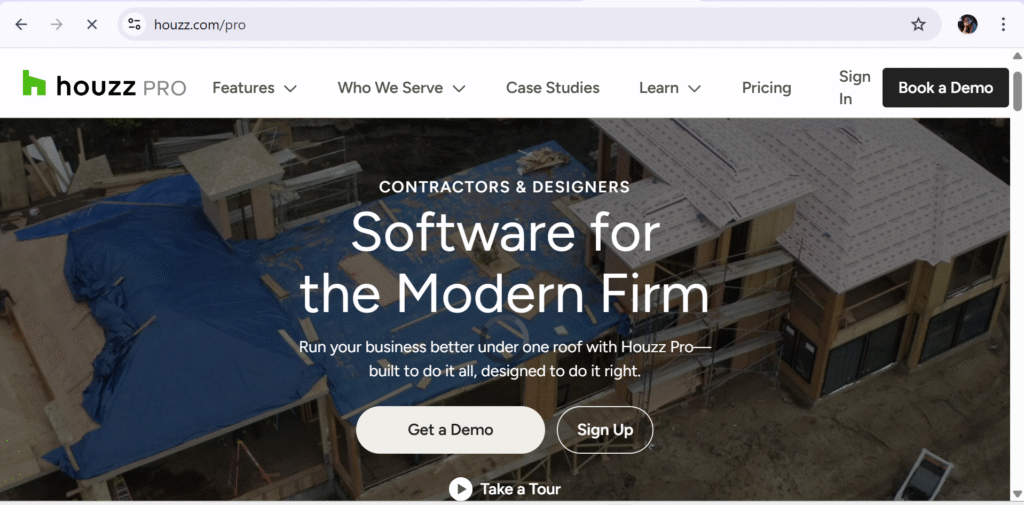
Overview
Houzz Pro is an all-in-one CRM and business management software specifically tailored for remodelers, interior designers, construction firms, and home improvement businesses. It extends the power of the Houzz marketplace—where millions search for contractors—by giving professionals tools for lead management, estimates, invoicing, and project collaboration. With its visually rich interface, Houzz Pro makes it easier for construction companies to showcase portfolios and attract new clients.
Key Features
- Centralizes inquiries from Houzz, website forms, ads, and social media into one CRM pipeline.
- Creates highly realistic 3D designs and mood boards to show clients what the final project will look like.
- Allows users to build detailed estimates with material lists, labor costs, and taxes.
- Helps teams coordinate schedules, assign tasks, and update clients in real time.
- Clients can pay deposits, installments, and invoices directly through the system.
- Lead Management & Client Dashboard
Review
Houzz Pro stands out for its visual appeal and all-in-one functionality. Construction firms benefit from its ability to manage clients from initial inquiry to project completion without leaving the platform. The 3D planning and visual tools allow contractors to clearly communicate design ideas to clients, increasing satisfaction and reducing misunderstandings. Its CRM and project management tools are adaptable for other types of construction businesses.
Pros
- Visually rich and intuitive interface
- Streamlines lead management and project tracking
- Integrated estimates, invoices, and online payments
- Enhances client collaboration and transparency
Cons
- Best suited for residential and remodeling projects
- Higher cost compared to generic CRM.
Final Verdict
Houzz Pro is an ideal CRM for residential construction and remodeling businesses seeking a visually engaging platform that combines marketing, client management, and project tracking. It enhances client communication, supports professional proposals, and integrates marketing opportunities seamlessly.
10. Pipedrive CRM
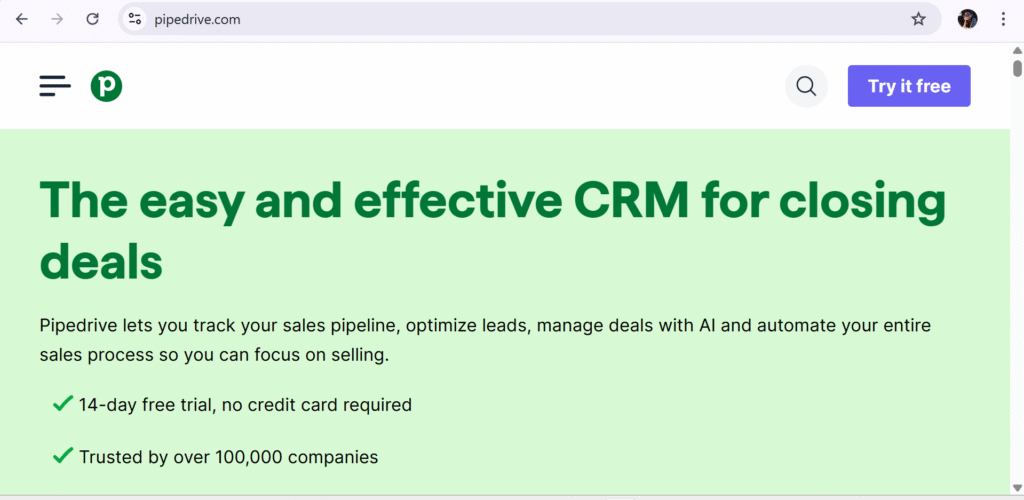
Overview
Pipedrive is a sales-driven CRM built for teams that want a simple, intuitive, and highly visual pipeline management system. Although it’s not exclusive to the construction industry, many contractors and builders use it because it’s easy to set up, easy to manage, and extremely effective at organizing leads and tracking project opportunities. Its drag-and-drop interface, automated workflows, and strong mobile app make it ideal for construction teams that frequently work on-site and need fast access to customer details and project updates.
Key Features
- Offers a clear, visual pipeline where construction teams can move leads
- Automates reminders, emails, and scheduling tasks to keep projects
- Teams can track job size, location, budget, expected start date.
- Provides quick access to contacts, tasks, and notes while working at job sites.
- Connects with QuickBooks, Google Workspace, Trello, Slack, and estimating tools.
- Integration with QuickBooks & Other Apps
Review
Pipedrive shines for construction teams seeking a simple yet powerful CRM to manage leads and client communication. Its visual sales pipeline allows contractors to see each lead’s status at a glance, reducing the risk of missed opportunities. Automated reminders, follow-ups, and task assignments save time and ensure consistent client engagement. Its flexibility make it a versatile choice for firms that want a lightweight CRM to streamline sales.
Pros
- Easy to use with a visual pipeline
- Automates follow-ups and tasks
- Accessible mobile app for field teams
- Flexible integrations with construction tools
Cons
- Not construction-specific
- Lacks built-in estimating or project management
Final Verdict
Pipedrive is a reliable CRM for construction businesses that want a simple, visual, and effective tool to manage leads, client communications, and follow-ups. It is especially useful for companies seeking a lightweight, easy-to-implement CRM.
Conclusion
Choosing the right CRM for your construction business can transform the way you manage clients, projects, and teams. The construction industry has unique challenges, from tracking leads across multiple sites to managing proposals, budgets, and deadlines simultaneously. A specialized CRM not only streamlines workflows but also ensures that no opportunity slips through the cracks.
From platforms like CoConstruct and TopBuilder, which are designed specifically for builders and remodelers, to versatile solutions like HubSpot and Pipedrive, which offer powerful automation and integrations, there is a CRM suited for every type and size of construction company. Tools such as Houzz Pro also help residential construction firms showcase portfolios while managing client communications seamlessly.
Investing in a reliable CRM means saving time, improving client satisfaction, and maximizing profitability. By carefully evaluating your company’s needs—whether it’s lead management, project tracking, automation, or client collaboration—you can select a platform that supports growth and efficiency. In 2025, construction companies that leverage CRM technology strategically will have a significant edge over competitors, ensuring better client relationships and more successful projects.
Frequently Asked Questions (FAQs)
Why do construction companies need a CRM?
A CRM centralizes client information, streamlines communication, and tracks leads and projects efficiently. For construction companies, this means better organization, timely follow-ups, and improved client satisfaction, leading to higher project conversion rates and business growth.
Which CRM is best for small construction firms?
For small construction businesses, Pipedrive or Zoho CRM are excellent choices due to their simplicity, flexibility, and cost-effectiveness. They offer visual pipelines, task automation, and integrations without overwhelming small teams with unnecessary features.
Can these CRMs handle project management as well?
Yes, many CRMs like CoConstruct, TopBuilder, and Houzz Pro provide built-in project management features such as task tracking, scheduling, budgeting, and document sharing. However, general CRMs like HubSpot or Pipedrive focus more on lead and client management and may require integrations for detailed project management.
Are these CRMs suitable for residential and commercial construction?
Most platforms are versatile enough to support both residential and commercial projects. Tools like Houzz Pro excel in residential projects with visual portfolios, while CoConstruct and TopBuilder are scalable for larger commercial construction workflows.
How do I choose the right CRM for my construction business?
Evaluate your company’s specific needs—lead management, project tracking, client collaboration, automation, and integrations. Consider factors like team size, budget, and desired features. It’s often beneficial to try free trials before committing to a subscription to ensure the CRM aligns with your workflows.
